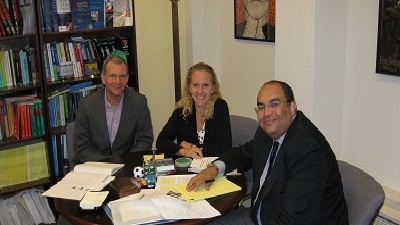World Bank research plays an increasingly important role in development, as the institution works closely with stakeholders around the world to build long-term infrastructure and social safety nets amid economic shocks.
“It’s all about evidence, evidence, evidence,” said Mahmoud Mohieldin, special envoy for the president of the World Bank. “What works? What doesn’t work? What are the preconditions for success?”
With data and research supporting a sustainable, long-term infrastructure, it’s much easier to convince Bank clients to take steps to promote long-term growth and avoid the rush to focus on short-term fixes, he said. “And the World Bank will be even more in demand than ever to provide support and manage risk.”
The Bank’s Global Financial Development Report, for example, covers timely topics, such as microfinance and financial inclusion, with policy-relevant metrics and country-by-country data, he said. Those quantifiable goals, much like President Jim Yong Kim’s goals to end poverty and boost shared prosperity, make progress more likely. “If you can’t measure it, you won’t be able to manage it.”
Mohieldin, who holds a doctorate in economics and now advises President Kim on the Millennium Development Goals and the post-2015 agenda, financial development and the G20, delved deep into World Bank research during his one-week visit in August at the Development Research Group, the Bank’s research department.
He held in-depth discussions with researchers working on a wide range of topics, such as long-term financial development, household survey data, energy, trade, and the political economy. He also met with staff in charge of Open Data at the Development Prospects Group. He said he will continue the dialogue with researchers and data experts on evidence-based policy solutions.
By spending time with both researchers and practitioners, the visit provided a unique opportunity to reflect on the political economy of reforms, bridging the Bank’s strongest theoretical and policy research and actual cases where change was supported on the ground in Latin America and Africa. It was an opportunity to further discuss proposals for long term finance, infrastructure, new measures of poverty and well-being, and frontier issues such as those to be treated in the upcoming WDR on the Behavioral and Social Foundations of Development.

